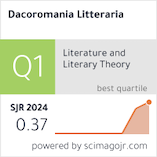LOLA SINOIMERI
FAIRE MÉMOIRE COMMUNE AUTOUR DES SILENCES. FICTIONS ET MÉMOIRES DES GUERRES DE YOUGOSLAVIE CHEZ ANILDA IBRAHIMI ET MARICA BODROŽIĆ
DOI: 10.33993/drl.2023.10.180.201
Affiliation: Sorbonne University and Paris 8 University; CEFRES – French Research Center in Humanities and Social Sciences, Prague.
Contact details: CEFRES, Na Florenci 3, CZ-110 00 Prague 1, Czech Republic.
Email: lola-sinoimeri@riseup.net
MAKING COMMON MEMORY AROUND SILENCES. FICTIONS AND MEMORIES OF THE WARS IN YUGOSLAVIA BY ANILDA IBRAHIMI AND MARICA BODROŽIĆ
(Abstract)
In this paper, I propose to examine Azade Seyhanʼs theory according to which transnational literatures have the power to make heard the voices that have been silenced by national history and memory, and thus to create a different kind of community. With this in mind, I analyse the narratives of the Yugoslav wars in two fictional novels written by Anilda Ibrahimi and Marica Bodrožić in the light of the concept of “common memory”. It seems that these novels, written by women with Balkan migrant backgrounds, seek not only to undo the national and very recent memory of the wars in Yugoslavia, but also to elaborate, by opposition, alternative memories of war and exile, around which it becomes possible to build community. I begin by analyzing the ways in which this common memory is elaborated in fiction: the two novels offer scenes of community reconstruction through the recounting and, above all, dialogue of the experiences of the exiled women, while respecting the flaws in their recollection. I then explore the extent to which these fictional narratives can function as models for the experience of writing and reading. Finally, the notion of horizon of expectation leads me to question the power of transnational literatures to create a common memory around silences: indeed, how can we ensure that these narratives of extreme violence are listened to and respected in a context of Western-centric horizon of expectation? With this in mind, I look at the ethical issues involved in representing war and the women who are its victims. To this end, I situate the publication of these novels in their specific context, that of the years following the wars in former Yugoslavia, and I examine the role of what Dragana Obradović calls the international gaze in the representations of the victims – their words and their silences – as well as the modes of narrative.
Keywords: exile, common memory, Yugoslavia, silence, transnational literature.
CREAREA UNEI MEMORII COMUNE ÎN JURUL TĂCERILOR. FICȚIUNI ȘI MEMORII ALE SCRIITOARELOR ANILDA IBRAHIMI ȘI MARICA BODROŽIĆ DESPRE RĂZBOIAELE DIN IUGOSLAVIA
(Rezumat)
În acest articol problematizez teoria lui Azade Seyhan, conform căreia literaturile transnaționale au puterea de a da glas vocilor care au fost reduse la tăcere de istoria și memoria naționale, creând astfel o comunitate aparte. În acest sens, utilizez conceptul de „memorie comună” pentru a analiza reprezentarea războaielor din Iugoslavia în două romane scrise de Anilda Ibrahimi și Marica Bodrožić. Aceste ficțiuni, aparținând unor autoare migrante, cu origini balcanice, își propun nu doar să demanteleze memoria națională și foarte recentă a războaielor din Iugoslavia, ci și să elaboreze, prin opoziție, memorii alternative ale războiului și ale exilului, în jurul cărora devine posibilă crearea unei comunități. Deschid articolul cu analiza modurilor în care această memorie comună este configurată ficțional: ambele romane includ secvențe de reconstrucție comunitară prin intermediul narativizării și, mai ales, al reprezentării dialogale a experiențelor femeilor exilate, oferind totodată o atenție specială și inconsistențelor din rememorările acestora. Ulterior, evaluez în ce măsură narațiunile menționate pot funcționa ca modele pentru experiența scrisului și a lecturii. În cele din urmă, noțiunea de orizont de așteptare mă determină să problematizez capacitatea literaturilor transnaționale de a crea o memorie comună în jurul tăcerilor: într-adevăr, cum putem garanta că aceste narațiuni de o violență extremă sunt ascultate și respectate într-un context dominat de orizontul de așteptare occidentalocentric? În consecință, articolul se focalizează și pe problemele etice implicate de reprezentarea ficțională atât a războiului, cât și a femeilor care îi sunt victime. Tocmai de aceea, situez acestor romane în contextul lor specific, cel al anilor care au urmat războaielor din fosta Iugoslavie, și analizez presiunea exercitată de ceea ce Dragana Obradović numește prejudecata occidentală asupra reprezentării narative a victimelor – în special, a cuvintelor și a tăcerilor acestora.
Cuvinte-cheie: exil, memorie comună, Iugoslavia, tăcere, literatură transnațională.


